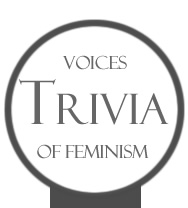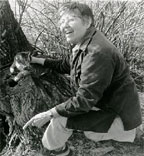Who says we're extinct?
Elana Dykewomon
Women and dinosaurs can't co-exist. It's in the fossil records. The idea of lesbian dinosaurs is a fiction, but like many fictions, appealing. It may comfort us radical dykes in our 50s-90s in an odd way –encouraging us to think of ourselves as misunderstood, unappreciated groups who tried valiantly to create revolution but got wiped out by planetary forces beyond our control, from consumerism to the internet. And dykes from their teens to thirties may be satisfied to reinvent wheels with the ancient perception of the young that this, this is the first time in history that this particular revolution has been tried.
Yes, monumental shifts in perception and access to traditional hierarchies have occurred in the last forty years, from when I anxiously joined the first "homophile association" at my college to Rachel Maddow (whose presence on cable news amazes me). Yet the ideals of Second Wave radical lesbians have definitely not materialized –an end to militaristic culture, new forms of non-hierarchical work and social organization, economic interdependence, racial parity, broadly distributed urban and rural lesbian collectives. Many of the radicals of the Second Wave are still radicals, still working for social justice in every situation –from trade unions to health care reform.
Every movement needs radical fringes to propel it, to make the center seem palatable to status quo consciousness (we see this on the right as well as the left). But as new generations come up, old and young radicals necessarily battle for space, language, definition. The 2009 catalog for Frameline, San Francisco's LGBT film festival, contains a description about a documentary on the lesbian singer, Ferron, that includes the line that it's "a rare chance to encounter a voice from the past." A voice from the past! A rare chance! What a kick in the head to all of us who thought we were still living in the present. Lesbian zombies, rising from the grave, our gravelly voices reaching out to rhythmically ensnare youth? Seeing lesbian performers who work within the context of social change movements, of any age, in any medium, is always a "rare chance."
That we don't know this, don't appreciate it, is mostly economics and ageism. We have missing links in our social structures, in our perceptions of each other's very bodies. We need places where our history is examined, accumulated and passed on: dyke institutes, Butch/Femme State University at Teaseboro, Dyke Hummingbird College of Applied Physics, Non-Patriarchal Event Production Trade School. We need to make these places wildly popular. How? If learning lesbian history has no monetary usefulness, doesn't fit into the given economies, how will we make it desirable?
Sex is one answer, but not enough. We need that energy of sex, the hormones of being fifteen, twenty, thirty, when we are happy to go to meetings and stay up all night, planning and dancing. We need to encourage friction for productivity, not just let it loose to explode. We need dyke chemistry professors who will uncover the formulas that allow gender queers, socialist feminists and dyke separatists to argue ourselves out of the old corners and back into imagination. Complexity, our non-hierarchical mentors will remind us, is the essence of every organism that stays vital. And this friction—in which Second Wave lesbian radicals and 2nd millennium queer activists collude to dismiss each other—is part of our ongoing complexity. Even as we nurse our grievances, we look over our shoulders to see what that other group is up to.
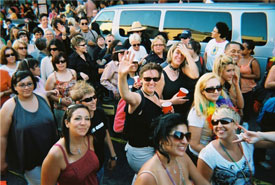 San Francisco Dyke March 2009 |
June is a big month for events in the San Francisco Bay Area. A confluence of causes this year had me both performing and going to the National Queer Arts Festival and other venues ten times, going to Frameline (the LGBT film festival), and continuing as an organizing member of the Dyke March. What I saw, what I heard about, was a mingling of ages, experiences, perspectives. Much more than when I was 20-30, young women are looking for/to the generations ahead of them as well as reacting to their (often media-manipulated or stereotypical) images of us. And often—much more frequently than anyone's propaganda would have us believe—we are working together.
The more I consider the evidence of the last month, the more I think this extinction idea is hooey. Dyke life is always being reinvented—we are generative, creative, funny, driven. So twenty-year-olds call themselves different names than Second Wave lesbians are always comfortable with (and vice versa), and in the midst of one of the greatest militaristic expansions in recent history, the values of "masculinity" have infiltrated lesbian life. Did we think we were immune to the outside world? Of course competing narratives confuse the issues at hand. When old dykes show up to take part (as opposed to giving a "when I was your age" lecture and leaving), we are welcomed. In fact, I often see a hunger for the continuity we represent and a desire to hash out political positions as peers.
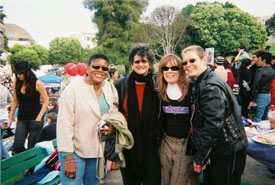 San Francisco Dyke March 2009 |
Ageism goes both ways and is alive and well. To think we old lesbians are going extinct mirrors both the arrogance and self-deprecation of our own youth. Startled not to be the center of the universe, sometimes bitter that we didn't make the revolution we envisioned (coming tomorrow to a lesbian nation near you!), we are easily wounded. When young dykes evince ignorance of what we did, or are startled to learn they come from a tradition (and didn't invent it), it's partly because we haven't been around, and partly because previous generations are always invisible to those coming up. Where exactly would they learn about Salsa Soul Sisters, the Chicago Women's Graphics Collective, the New Haven Women's Liberation Rock Band, Califia, Sagaris, the Women's Press Collective, the CLIT Papers, the Combahee River Collective?
My friend-of-thirty-years SJ and I were having breakfast and I said when I was younger I used to be perplexed about the exact moment day turned to night. I'd sit on cliffs and watch it happen. When it got too dark for me to see the path back without a flashlight, then it was night. But what moment, what place, when exactly did it change? Now now now now now no not yet oh you missed it. And that's what I feel about us. One minute we were the movement: we were in the middle of it, struggling, yelling, creating, singing, making love, having dramatic & gleeful romance, inhaling drugs, going on marches and running off newsletters and then journals and organizing classes and demos and silk-screening posters in basements and holding conferences in the woods and: the next moment we were your mother's feminism, absurd, too-sober separatists whose essentialism was holding up the next great push for rights and couldn't we just get out of the way. At least, that's how we often feel about it.
SJ said it was Act Up, it was the AIDS epidemic, when the separatists –who certainly had strong opinions about things but as political movements go were relatively well behaved (well, we never lured our former comrades out into the woods and shot them)—became scapegoated, became the reason why whatever it was wasn't working out, became the holders of racism and classism. Somehow the women who wanted to make their lives, their activist lives, with other women were suspect, and the things we called ourselves, especially lesbian, were stodgy, old fashioned, bowing to the white supremacist culture of Greece. (This from a generation who thinks supporting the culture of marriage is revolutionary!) (Strategic, maybe, but revolution means changing the given structure, not simply copying it, doesn't it?) (That's another essay.) And that's part of the trouble. As we get older our essays blend together. We see the interlocking Jenga tower of beams—we're adept at pulling out supports and placing them in new configurations but it's complex; we know complexity when we see it, we've watched a hundred towers fall down.
Some days I want to say it's just getting old, the new generation taking up its space, passionate about new language for itself, and that's good even if sometimes I experience that new definitions parse me out of existence. When I feel that, it's my job to re-enter the conversation. When I was twenty-two I signed up for a shift on Wednesday afternoon at the Valley Women's Center in Northampton, MA, to answer the phones and open the mail and talk to women who dropped in; and my partner on those Wednesdays was a thirty-three year old straight white Catholic anti-war activist who'd recently been arrested for dumping a bucket of blood (or red paint) on a military plane after managing to get through a hole in the fence. Cool, I thought, I hope I'm still that much of an activist when I'm 33, that old. That old!
Now I'm just months away from 60, which seems impossible except when I look down and see the changed skin on my arms and remember how smooth our bodies were, how like seal pups, when we were 17 and first in love. It's a cacophony out there, everywhere, where you are reading this. Noisy as hell and perhaps those of us who have been adding to the din for awhile are repeating ourselves and too often our stories sound like, when I was your age...
But when I was your age I had twenty lovers and told the straight feminists I was glad not to be a "woman" and got stoned and went on long rides in the country where we figured out the meaning of life and came home and wrote essays and distributed women's films.
Do young women think we're your mothers? Are you bored when we remember Cagney and Lacey fondly? Do you feel talked down to and unheard? Bring your number 2 pencils. If you pass this test, the world is your oyster. And we are still your pearls.
Oh, too easy by far. No tests in the dyke institute. Only hunger for truth. Only love the argument. Only allow everyone to speak. Old lesbian space is an open meadow, a city park, full of drumming. I know it's hard to stay connected; our culture, North American capitalist culture, is isolating. But we have worked all our lives to create room. We are still working. And so many of us are, are still working—creating visions, political action groups, carving out queer access to healthcare. By now many of us have jobs inside of institutions—inside the medical center, the university, the metro transit system. Young women carry our activist dna forward, whether it's obvious or not. Old dykes rely on those coming up to find us, to make clear new demands of the systems we've wiggled ourselves into.
Once I wrote a historical novel because I felt in my bones that my generation hadn't sprung from nowhere to remake the world whole. And I discovered in obscure texts that, in fact, we followed the same patterns in organizing and relationships as earlier lesbians (who would have been loathe to use that term) –lesbians who created the labor movement of the Progressive Era, from the beginning of the 20th century to WW1. Perhaps the next generation is too close to us, making it harder for us to reach across the different languages we developed to fit our perspectives. Perhaps it's the militarism of our time which has injected "either with us or against us" into every area of public discourse.
Or maybe everyone is some form of fanatic in their youth. It's not that we sell out, but that we eventually temper our positions with the long view, with the hard- won knowledge that ideology is a way of life but relationships are life, and need to be our priority.
In the 1970s, the town I lived in had a dyke patrol, and we fought fairly bitterly about whether or not we would patrol the one bar in town that had a "women's night" once a week. Some of us maintained that women who drink should know what they're getting into—it's patriarchal bar culture. We're only going to protect the women who come to women's shows in the lesbian spaces. Moralists! the other side yelled. Who are you to judge how someone should spend her night off? And so dyke patrol split in two, and half of us patrolled the bar and the other half patrolled Lesbian Gardens and some of us went off into the night defacing billboards and spray-painting "rapist" on the cars of men who damaged women and some of those anonymous night avengers were from both sides of the argument because after all it was a small town and we really did love each other.
We did it for love.
We still do.
Well, us old dykes don't climb up the billboard ladders anymore because we know what can happen to our bones if we fall. We leave that to you.
About the Author
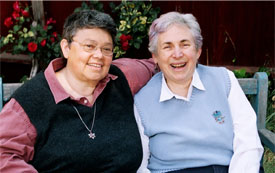 Elana & Susan |
Elana Dykewomon has been a cultural worker and social justice activist since the 1970s. She is the 2009 recipient of the Duggins Outstanding Mid-Career Novelists' Prize. Her seventh book, Risk (a novel) is new (!) from Bywater Books. Her Jewish lesbian historical novel, Beyond the Pale, won the Lambda Literary and Ferro-Grumley lesbian novel awards. Dykewomon was editor of the lesbian feminist journal, Sinister Wisdom, for nine years; co-coordinated disabled and senior access for the San Francisco Dyke March until 2010; teaches literature at SFSU and offers private creative writing classes— see www.dykewomon.org. She lives in Oakland, California with her partner, Susan, surrounded by friends.
Join our Trivia - Voices of Feminism group on Facebook
